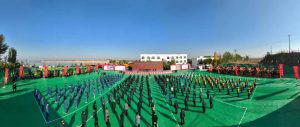
In masonry foundations, cement gypsum mortar must be used because mixed gypsum mortar is an air-hardening material that loses strength due to moisture. However, the fluidity and water retention of gypsum mortar directly affect the thickness, density and filling degree of gypsum mortar joints, which in turn affects the strength of the masonry. Mixed gypsum mortars generally have better fluidity and water retention than cement gypsum mortars.
It is made of cement, sand and water in a certain proportion. Typically used on masonry buildings, walls or floors in damp environments or in water. In order to save the amount of cement or lime and improve the workability of gypsum mortar, mix cement or lime gypsum mortar with an appropriate amount of fly ash, diatomaceous earth and other additives. The compressive strength of gypsum mortar is expressed in terms of gypsum mortar grade. Ordinary gypsum mortar grades are 4, 10, 25, 50100, etc.
Our self-built houses are often plastered with cement gypsum mortar. Ordinary concrete can only be used for pressure-bearing structures, such as the foundation and columns of a house, and cannot be used for structures that primarily bear tension, such as the beams and floors of a house. Reinforced concrete allows the two to work together. The concrete tightly wraps the steel bars together. When subjected to external loads, both materials exert their respective mechanical properties.
Cement gypsum mortar is prone to cracking, which is one of the reasons why mixed gypsum mortar is used instead of cement gypsum mortar for interior wall plastering. In addition, from the appearance point of view, attention should be paid to the water retention of gypsum mortar during transportation. Cement gypsum mortar does not retain water as well as mixed gypsum mortar. During the bumpy transportation process, there is a layer of water on the surface of the cement gypsum mortar, and the workability and water retention of the mixed gypsum mortar are better than those of the cement gypsum mortar.
As the aggregate of concrete or cement gypsum mortar, if there is dust, clay or other organic impurities, it will affect the bonding strength between cement, sand and stone. , thereby reducing the compressive strength. Cured gypsum screeds or concrete components will lose strength if they are regularly exposed to high temperatures, which may affect the strength after curing. </p

 微信扫一扫打赏
微信扫一扫打赏

